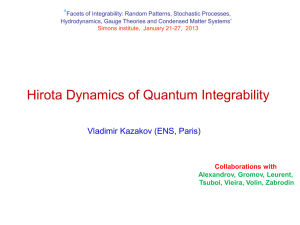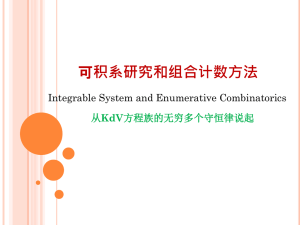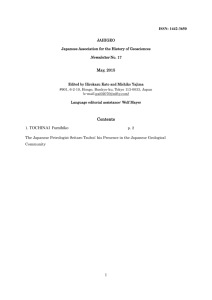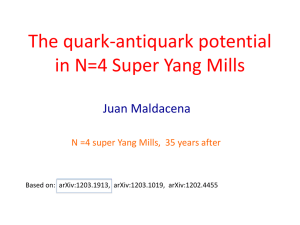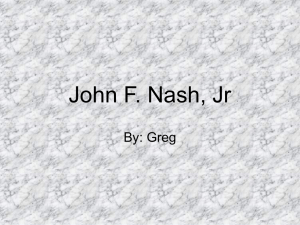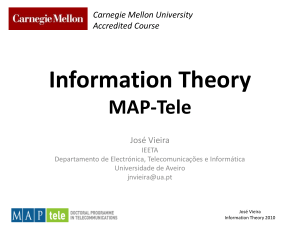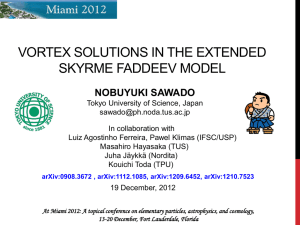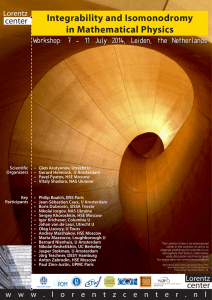from quantum spin chains to AdS/CFT integrability - Hu
advertisement
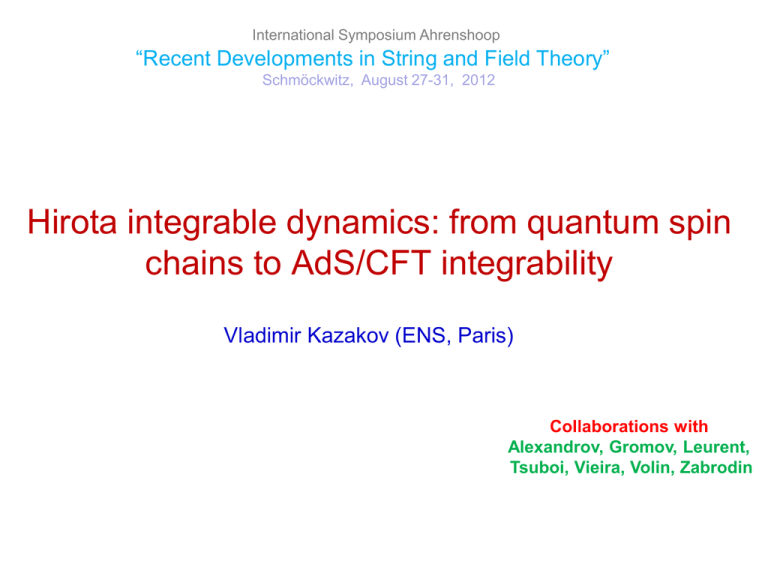
International Symposium Ahrenshoop “Recent Developments in String and Field Theory” Schmöckwitz, August 27-31, 2012 Hirota integrable dynamics: from quantum spin chains to AdS/CFT integrability Vladimir Kazakov (ENS, Paris) Collaborations with Alexandrov, Gromov, Leurent, Tsuboi, Vieira, Volin, Zabrodin Hirota equations in quantum integrability • New approach to solution of integrable 2D quantum sigma-models in finite volume • Based on discrete classical Hirota dynamics (Y-system, T-system , Baxter’s Q-functions, Plücker QQ identities, wronskian solutions,…) + Analyticity in spectral parameter! • Important examples already worked out, such as su(N)×su(N) principal chiral field (PCF) Gromov, V.K., Vieira V.K., Leurent • FiNLIE equations from Y-system for exact planar AdS/CFT spectrum Gromov, Volin, V.K., Leurent • Inspiration from Hirota dynamics of gl(K|M) quantum (super)spin chains: mKP hierarchy for T- and Q- operators V.K., Leurent, Tsuboi Alexandrov, V.K., Leurent,Tsuboi,Zabrodin Y-system and T-system • Y-system • T-system (Hirota eq.) Related to a property of gl(N|M) irreps with rectangular Young tableaux: = a s • Gauge symmetry s + s-1 s+1 a-1 a+1 Quantum (super)spin chains Quantum transfer matrices – a natural generalization of group characters Co-derivative – left differential w.r.t. group (“twist”) matrix: V.K., Vieira Main property: Transfer matrix (T-operator) of L spins R-matrix Hamiltonian of Heisenberg quantum spin chain: Master T-operator Generating function of characters: Master T-operator: It is a tau function of mKP hierachy: (polynomial w.r.t. the mKP charge ) Satisfies canonical mKP Hirota eq. Hence - discrete Hirota eq. for T in rectangular irreps: Commutativity and conservation laws V.K.,Vieira V.K., Leurent,Tsuboi Alexandrov, V.K., Leurent,Tsuboi,Zabrodin Master Identity and Q-operators V.K., Leurent,Tsuboi • Graphically (slightly generalized to any spectral parameters): The proof in: V.K., Leurent,Tsuboi from the basic identity proved in: V.K, Vieira Baxter’s Q-operators V.K., Leurent,Tsuboi Generating function for characters of symmetric irreps: s • • Q at level zero of nesting Definition of Q-operators at 1-st level of nesting: « removal » of an eigenvalue (example for gl(N)): Def: complimentary set • Next levels: multi-pole residues, or « removing » more of eignevalues: • Nesting (Backlund flow): consequtive « removal » of eigenvalues Alternative approaches: Bazhanov, Lukowski, Mineghelli Rowen Staudacher Derkachev, Manashov Hasse diagram and QQ-relations (Plücker id.) Tsuboi V.K.,Sorin,Zabrodin Gromov,Vieira Tsuboi,Bazhanov • Example: gl(2|2) Hasse diagram: hypercub • E.g. - bosonic QQ-rel. -- fermionic QQ rel • Nested Bethe ansatz equations follow from polynomiality of along a nesting path • All Q’s expressed through a few basic ones by determinant formulas • T-operators obey Hirota equation: solved by Wronskian determinants of Q’s Krichever,Lipan, Wiegmann,Zabrodin Wronskian solutions of Hirota equation • We can solve Hirota equations in a strip of width N in terms of differential forms of N functions . Solution combines dynamics of gl(N) representations and the quantum fusion: Gromov,V.K.,Leurent,Volin • -form encodes all Q-functions with indices: a s • E.g. for gl(2) : • Solution of Hirota equation in a strip: • For gl(N) spin chain (half-strip) we impose: Inspiring example: • Y-system principal chiral field Hirota dynamics in a in (a,s) strip of width N • Finite volume solution: finite system of NLIE: parametrization fixing the analytic structure: polynomials fixing a state Gromov, V.K., Vieira V.K., Leurent jumps by • From reality: • N-1 spectral densities (for L ↔ R symmetric states): SU(3) PCF numerics: Energy versus size for vacuum and mass gap V.K.,Leurent’09 E L/ 2 L Spectral AdS/CFT Y-system Gromov,V.K.,Vieira • Dispersion relation • Parametrization by Zhukovsky map: a • Extra “corner” equations: • cuts in complex s Type of the operator is fixed by imposing certain analyticity properties in spectral parameter. Dimension can be extracted from the asymptotics -plane Wronskian solution of u(2,2|4) T-system in T-hook Gromov,V.K.,Tsuboi Gromov,Tsuboi,V.K.,Leurent Tsuboi definitions: Plücker relations express all 256 Q-functions through 8 independent ones Gromov,V.K.,Leurent,Volin Solution of AdS/CFT T-system in terms of finite number of non-linear integral equations (FiNLIE) • Main tools: integrable Hirota dynamics + analyticity (inspired by classics and asymptotic Bethe ansatz) • Original T-system is in mirror sheet (long cuts) Arutyunov, Frolov • No single analyticity friendly gauge for T’s of right, left and upper bands. We parameterize T’s of 3 bands in different, analyticity friendly gauges, also respecting their reality and certain symmetries We found and checked from TBA the following relation between the upper and right/left bands Inspired by: Bombardelli, Fioravanti, Tatteo Balog, Hegedus • Irreps (n,2) and (2,n) are in fact the same typical irrep, so it is natural to impose for our physical gauge • From unimodularity of the quantum monodromy matrix Alternative approach: Balog, Hegedus Quantum symmetry Gromov,V.K. Leurent, Tsuboi Gromov,V.K.Leurent,Volin can be analytically continued on special magic sheet in labels Analytically continued each in its infinite strip. and satisfy the Hirota equations, Magic sheet and solution for the right band • The property suggests that certain T-functions are much simpler on the “magic” sheet, with only short cuts: • Only two cuts left on the magic sheet for ! • Right band parameterized: by a polynomial S(u), a gauge function with one magic cut on ℝ and a density Parameterization of the upper band: continuation • Remarkably, choosing the q-functions analytic in a half-plane we get all T-functions with the right analyticity strips! We parameterize the upper band in terms of a spectral density the “wing exchange” function and gauge function and two polynomials P(u) and (u) encoding Bethe roots The rest of q’s restored from Plucker QQ relations , Closing FiNLIE: sawing together 3 bands We have expressed all T (or Y) functions through 6 functions From analyticity of and we get, via spectral Cauchy representation, extra equations fixing all unknown functions Numerics for FiNLIE perfectly reproduces earlier results obtained from Y-system (in TBA form): Konishi operator : numerics from Y-system Beisert, Eden,Staudacher Gubser,Klebanov,Polyakov ABA Gubser Klebanov Polyakov From Y-system numerics Gromov,V.K.,Vieira (confirmed and precised by Frolov) quasiclassics Gromov,Shenderovich, Serban, Volin Roiban,Tseytlin Masuccato,Valilio Gromov, Valatka Leurent,Serban,Volin Bajnok,Janik zillions of 4D Feynman graphs! Fiamberti,Santambrogio,Sieg,Zanon Velizhanin Bajnok,Janik Gromov,V.K.,Vieira Bajnok,Janik,Lukowski Lukowski,Rej,Velizhanin,Orlova Eden,Heslop,Korchemsky,Smirnov,Sokatchev Uses the TBA form of Y-system AdS/CFT Y-system passes all known tests Cavaglia, Fioravanti, Tatteo Gromov, V.K., Vieira Arutyunov, Frolov Conclusions • Hirota integrable dynamics, supplied by analyticity in spectral parameter, is a powerful method of solving integrable 2D quantum sigma models. • Y-system can be reduced to a finite system of non-linear integral eqs (FiNLIE) in terms of Wronskians of Q-functions. • For the spectral problem in AdS/CFT, FiNLIE represents the most efficient way for numerics and weak/strong coupling expansions. • Recently Y-system and FiNLIE used to find quark-antiquark potential in N=4 SYM Future directions • Better understanding of analyticity of Q-functions. Correa, Maldacena, Sever, Drukker Gromov, Sever Quantum algebraic curve for AdS5/CFT4 ? • Why is N=4 SYM integrable? • FiNLIE for another integrable AdS/CFT duality: 3D ABJM gauge theory • BFKL limit from Y-system? • 1/N – expansion integrable? • Gluon amlitudes, correlators …integrable? END
